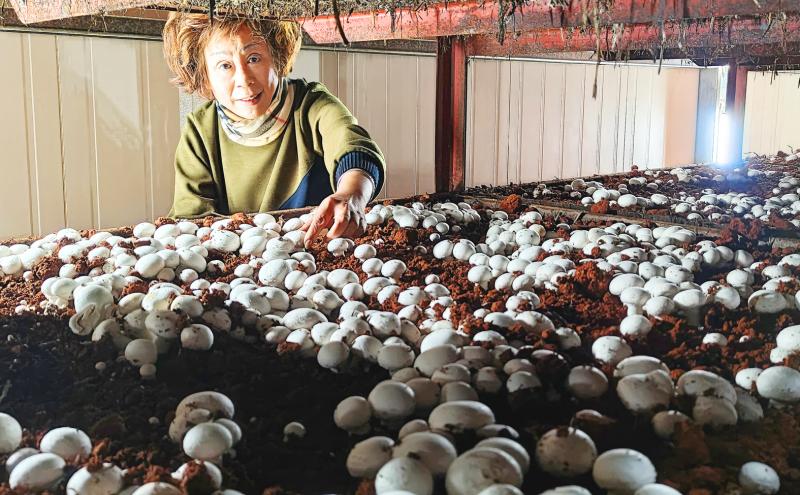Farmer Lee Mei-ling (李美玲) has revived the mushroom industry in Changhua County’s Jhutang Township (竹塘) after adding modern facilities to her traditional mushroom farm.
The township had been Taiwan’s No. 1 producer of mushrooms until 20 years ago, when it fell behind other regions that were using improved techniques to grow larger mushrooms.
The township steadily declined as a producer until it was seen as a source of cheap agricultural products.

Photo: Chen Kuan-pei, Taipei Times
However, Lee 13 years ago set off on a path that would eventually make Jhutang Township a renowned producer of mushrooms once again.
She started by renovating an old warehouse used for growing mushroom by installing air-conditioning and an environmental management system.
Lee was soon able to grow mushrooms larger than any ever grown in the township, and began receiving orders from larger markets and wholesalers.
Today, she sells 400kg of mushrooms per day — more than any other Taiwanese producer.
“The characteristics of the land in Jhutang Township, as well as the wet conditions in winter, make it ideal for growing mushrooms,” Lee said.
In the 1980s, there were 400 mushroom farms in the township, each about 50 ping (165m2), but by 20 years ago most of them had closed.
After Lee installed the environmental control system and began seeing success with her new growing techniques, she shared those techniques with others in the township, and today there are 100 thriving farms.
“However, the technology has its limitations. A northeast monsoon can destroy the crop. There are also limits to production quality, which might call for a change to the fermentation process,” she said.
Newer techniques require only 21 days for fermentation, compared with 30 days for more traditional techniques, she said, adding that some growers have also experimented with separating fermentation beds, or using amino acids in the water.
Such techniques could speed up fermentation by another week, which lessens the chance of crop damage from disease or insects, she added.
Modern environmental control systems are more environmentally friendly than the oil heaters previously used by farms, but also consume a lot of power, she said, adding that she has tackled the problem by installing solar panels.
Her farm also recycles the water produced by the air-conditioning units, she added.
The farm would remain focused on ways to further improve production quality, Lee said.

A preclearance service to facilitate entry for people traveling to select airports in Japan would be available from Thursday next week to Feb. 25 at Taiwan Taoyuan International Airport, Taoyuan International Airport Corp (TIAC) said on Tuesday. The service was first made available to Taiwanese travelers throughout the winter vacation of 2024 and during the Lunar New Year holiday. In addition to flights to the Japanese cities of Hakodate, Asahikawa, Akita, Sendai, Niigata, Okayama, Takamatsu, Kumamoto and Kagoshima, the service would be available to travelers to Kobe and Oita. The service can be accessed by passengers of 15 flight routes operated by

Alain Robert, known as the "French Spider-Man," praised Alex Honnold as exceptionally well-prepared after the US climber completed a free solo ascent of Taipei 101 yesterday. Robert said Honnold's ascent of the 508m-tall skyscraper in just more than one-and-a-half hours without using safety ropes or equipment was a remarkable achievement. "This is my life," he said in an interview conducted in French, adding that he liked the feeling of being "on the edge of danger." The 63-year-old Frenchman climbed Taipei 101 using ropes in December 2004, taking about four hours to reach the top. On a one-to-10 scale of difficulty, Robert said Taipei 101

Taiwanese and US defense groups are collaborating to introduce deployable, semi-autonomous manufacturing systems for drones and components in a boost to the nation’s supply chain resilience. Taiwan’s G-Tech Optroelectronics Corp subsidiary GTOC and the US’ Aerkomm Inc on Friday announced an agreement with fellow US-based Firestorm Lab to adopt the latter’s xCell, a technology featuring 3D printers fitted in 6.1m container units. The systems enable aerial platforms and parts to be produced in high volumes from dispersed nodes capable of rapid redeployment, to minimize the risk of enemy strikes and to meet field requirements, they said. Firestorm chief technology officer Ian Muceus said

MORE FALL: An investigation into one of Xi’s key cronies, part of a broader ‘anti-corruption’ drive, indicates that he might have a deep distrust in the military, an expert said China’s latest military purge underscores systemic risks in its shift from collective leadership to sole rule under Chinese President Xi Jinping (習近平), and could disrupt its chain of command and military capabilities, a national security official said yesterday. If decisionmaking within the Chinese Communist Party has become “irrational” under one-man rule, the Taiwan Strait and the regional situation must be approached with extreme caution, given unforeseen risks, they added. The anonymous official made the remarks as China’s Central Military Commission Vice Chairman Zhang Youxia (張又俠) and Joint Staff Department Chief of Staff Liu Zhenli (劉振立) were reportedly being investigated for suspected “serious